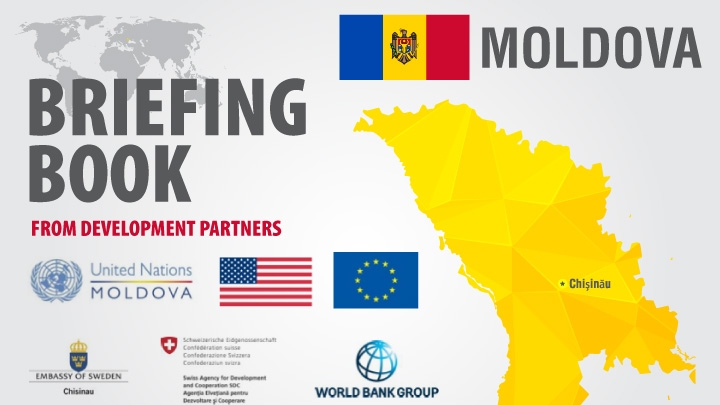The Briefing Book sets out the viewpoint of development partners on key development and cooperation issues in Moldova, as well as provides a viable platform for policy dialogue and strategic partnership with the Government of the country.
In addition, the recommendations provided could serve as a reference for the short and medium-term programming of the Government.
The development community mentioned in this context: "Moldova’s development partners look forward to a strategic partnership with the new Government for the benefit of the people of Moldova. In the spirit of the Development Partnership Principles, we look forward to supporting and working together with the Government as it takes the lead on realising the country’s development strategy. This Briefing Book indicates our willingness to help the Government tackle the country's most pressing challenges."
Prime Minister Chiril Gaburici mentioned during the event: "Our country has received a significant support from European states. We will carefully analyse the proposals of the development partners. Some of them are already in progress, others still remain to be accomplished. This represents a new beginning in the relations of Moldova and its development partners".
Background information
The Briefing Book consists of 30 policy notes on key issues related to the development of the country, including energy, justice and police reform, economy and the banking sector, civil society and vocational educational training.
The Briefing Book draws the attention of the new Government to challenges which need to be addressed in a timely manner:
The need to ensure a stable economic environment and sound management of public finances:
A well regulated and reliable banking sector is fundamental to business, citizens and international investors. At the same time a robust system of public financial management should be in place to ensure transparency and accountability of public finances. Moldova should develop a competitive business environment attractive to new investment, as well as take advantage of new trading opportunities through effective implementation of the DCFTA.
Uneven progress hinders development achievements:
Rural Moldova continues to lag behind changes happening in a few cities in terms of poverty, jobs and access to basic services. Gender inequality also poses a significant loss to overall socioeconomic advancement. Equity lies at the heart of the future global Sustainable Development Goals agenda. A focus on overcoming inequalities will accelerate economic growth and tap into the full human capital potential in Moldova.
Justice and public administration are the bedrock for all sectors, in particular this means making concrete progress in fighting corruption:
Genuine reforms in justice and public administration would underpin the success of reforms in all other sectors. Guaranteed access to fair and independent justice is important to businesses, it also safeguards respect for fundamental human rights for every person. There is an urgent need for defining a strategy for reform at both central and local level in public administration reform and for a clear mandate for the regional authorities. The influence of corruption in public life, including public procurement of goods and services needs to be eliminated and EU/international expertise for supervision/oversight of tenders and privatizations is recommended.
Development with and by people:
Engaging people in new ways can be a crucial dimension of the public administration and decentralization reform. Civil society should be further empowered to play its vital watchdog role. There is a need to ensure inclusiveness and promote cohesion of society, and take an approach that engages people on both banks of the Nistru
A coordinated approach to development:
Today’s multifaceted development challenges require solid institutional coordination and a “whole-of-government” approach. Moving to genuine implementation of the Government’s program and prioritized investment will require a robust institutional coordination mechanism. This includes an effective coordination mechanism for external assistance linked to a sound medium term planning and budgeting framework. Implementation of the Association Agreement and the public investment program should be nested within such an approach.
Leveraging development assistance to maximum effect:
Activation of the Joint Partnership Council, established in 2010 in line with the Development Partnership Principles and continuation of sector councils can provide the platforms for the effective coordination of external cooperation.
